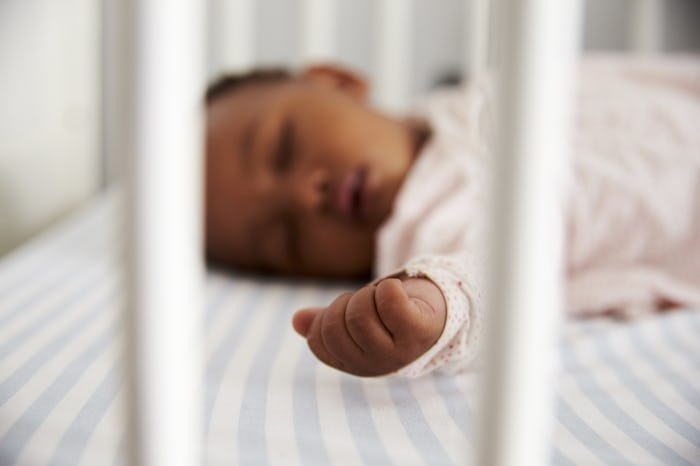Life
Educated Black Women Have Some Of The Highest Infant Mortality Rates, & It's So Sad
The more education white women have correlates to the lower infant mortality rate among them, thanks to a number of factors associated with education that keep infants safer — but education isn't protection against infant mortality for black women, according to recent research. In fact, in contrast to white women, the most educated black women are actually the most likely to lose their babies.
But why is it the opposite for black women? According to the new report, Fighting at Birth: Eradicating the Black-White Infant Mortality Gap, the stress from dealing with both sexism and racism can lead to premature delivery of low birth-weight babies. Researchers have long known that black mothers' infant mortality rate is about twice that of white women, and that black women don't get the same protection from education and higher socioeconomic status that white women do, according to Duke Today. But these findings prove a further point.
The most significant factor in reducing the rate of death among children younger than 5, by far, according to the Scientific American, is education for women. In countries across the globe, any increase in female schooling — whether it's just one, two or three years —correlates with a decline in infant mortality. Women who have more education tend to have smaller families, largely because of their employment opportunities and increased knowledge about contraception. And more education also means that women tend to make better decisions about health and disease factors like prenatal care, basic hygiene, nutrition and immunization, according to the Scientific American.
But even educated black women are losing their babies. So it's not necessarily their education or lack thereof that's contributing to their high infant mortality rate. According to the recent research, it's stress.
"When you’re the only black woman in the room, when you’re often working in elite circles where you are the first or you are the only, there is a toll to be paid," Keisha Bentley-Edwards, co-author of the report, explained, according to Bloomberg. Bentley-Edwards is speaking from her experience as a black woman and as a professor of general internal medicine at Duke University and an associate research director at Duke’s Samuel DuBois Cook Center on Social Equity. She completed her research in conjunction with the Insight Center for Community Economic Development in Oakland, California.
Stress can take a toll on anyone's body — it's known as “weathering,” Bloomberg reported, and it has wide-ranging health effects that may manifest themselves during pregnancy. High levels of stress that continue for a long time (like stress from battling sexism and racism on the daily) may cause health problems, like high blood pressure and heart disease, and it can increase a woman's chances of having a premature baby (born before 37 weeks of pregnancy) or a low-birthweight baby (weighing less than 5 1/2 pounds), according to March of Dimes. And babies that are born too soon or too small are at an increased risk for health problems.
Black women already face unfair treatment when it comes to maternal healthcare. According to the Centers for Disease Control, black mothers in the U.S. die at three to four times the rate of white mothers. And NPR put it reported that "a black woman is 22 percent more likely to die from heart disease than a white woman, 71 percent more likely to perish from cervical cancer, but 243 percent more likely to die from pregnancy or childbirth-related causes."
The disproportionate toll on their lives (which occurs at the same rate as women in countries such as Mexico and Uzbekistan) is the main reason the U.S. maternal mortality rate is so much higher than that of other developed, affluent countries, according to the World Health Organization.
The problem plaguing expectant black mothers is pervasive, and those problems are amplified by unconscious biases that are embedded throughout the medical system, according to ProPublica. These biases affect the quality of care sometimes even in subtle ways, according to the more than 200 stories of African-American mothers that ProPublica and NPR have collected over the past year. These mothers consistently reported feeling devalued and disrespected by medical providers.
Bentley-Edwards said the new report, Fighting at Birth, puts all the recent research into the treatment of pregnant black women together in a "digestible" form, and it advocates for solutions that she said the medical establishment has resisted. For example, Fighting at Birth recommends support for programs and advocacy groups for black mothers; protocols to minimize bias by health-care providers; enforcement of laws against discrimination against black women; increased social support for expectant black women; and encouragement of breastfeeding, among other fixes, according to Bloomberg.
She also said the report should not be taken as a message to black women to think twice about getting an advanced education, according to Bloomberg, because education isn't the problem. We need to instead attack the "stressor."
"Eliminate job discrimination," she said, Bloomberg reported. "We need allies to step in when we see a black woman at work not being treated the way she should be. The woman shouldn’t feel guilty that she’s complicit."
The fixes won't happen over night, but there's a lot of work to be done to save black women's lives.
